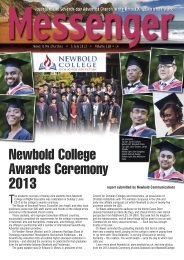Sixty-first session of the NEC - Seventh-day Adventist Church in the ...
Sixty-first session of the NEC - Seventh-day Adventist Church in the ...
Sixty-first session of the NEC - Seventh-day Adventist Church in the ...
Create successful ePaper yourself
Turn your PDF publications into a flip-book with our unique Google optimized e-Paper software.
2<br />
editorial<br />
3<br />
Prote<strong>in</strong> –<br />
how much is too much?<br />
In this issue we recommence our focus on current UK health news by<br />
look<strong>in</strong>g at some emerg<strong>in</strong>g research on prote<strong>in</strong> supplements.<br />
A BBC Health News onl<strong>in</strong>e report (Newsbeat), 3 September, 2012,<br />
carried <strong>the</strong> head<strong>in</strong>g: ‘Dieticians say extra prote<strong>in</strong> can do more harm<br />
than good.’ The article, written by Newsbeat reporter Rick Kelsey,<br />
advises caution as to how much prote<strong>in</strong> we <strong>in</strong>gest.<br />
Comment<strong>in</strong>g specifically on prote<strong>in</strong> supplements used by gym<br />
users and sports enthusiasts, he highlights <strong>the</strong> warn<strong>in</strong>g aga<strong>in</strong>st<br />
overus<strong>in</strong>g <strong>the</strong>se supplements, which can <strong>of</strong>ten cause harm. He states:<br />
‘The British Dietetic Association (BDA) says high levels <strong>of</strong> additional<br />
prote<strong>in</strong> can cause side effects, which can <strong>in</strong>clude nausea as well as<br />
kidney and liver damage. . . . It wants clearer warn<strong>in</strong>gs about what is<br />
<strong>in</strong> <strong>the</strong> powders and tablets.’<br />
Confirm<strong>in</strong>g this caution, Jane Griff<strong>in</strong>, a former British Olympic<br />
dietician speak<strong>in</strong>g for <strong>the</strong> BDA, states: ‘The more prote<strong>in</strong> <strong>in</strong> your diet,<br />
<strong>the</strong> more you have to get rid <strong>of</strong>. People who have <strong>the</strong>se high-prote<strong>in</strong><br />
diets are now runn<strong>in</strong>g <strong>in</strong>to problems with <strong>the</strong>ir kidneys because <strong>of</strong> <strong>the</strong><br />
amount <strong>of</strong> prote<strong>in</strong> <strong>the</strong>y must get rid <strong>of</strong>.’<br />
Rick Kelsey reports, however, that <strong>in</strong> response to this statement<br />
manufacturers claim: ‘Consumers are well<br />
protected, with only 11 reported reactions <strong>in</strong> 11 years.’<br />
One gym enthusiast, and previous heavy prote<strong>in</strong> supplement user, is<br />
22-year-old Richard from Chesterfield, who shared with Newsbeat <strong>the</strong><br />
negative effects he encountered. Accord<strong>in</strong>g to him: ‘It felt like I was on<br />
drugs . . . I was shak<strong>in</strong>g and I got angry. It also had an effect on my<br />
girlfriend, who didn’t want to be around me when I had taken it.’<br />
Richard told Newsbeat that he had been tak<strong>in</strong>g supplements for<br />
four years, but had a bad reaction to one <strong>of</strong> <strong>the</strong>m. He reports that<br />
although he still takes some prote<strong>in</strong> supplements, he has now cut<br />
down significantly.<br />
Gym supplements are scrut<strong>in</strong>ised under our food laws, which<br />
<strong>in</strong>dicate that <strong>the</strong>y have to be adequately labelled – however, <strong>the</strong><br />
products and content can vary. This is different to medic<strong>in</strong>es, where<br />
<strong>the</strong> legal requirements are that <strong>the</strong>y specify <strong>the</strong> content accord<strong>in</strong>g to<br />
rigorous guidel<strong>in</strong>es.<br />
Guidance from <strong>the</strong> Department <strong>of</strong> Health is that adults avoid<br />
consum<strong>in</strong>g more than twice <strong>the</strong> recommended daily <strong>in</strong>take <strong>of</strong> prote<strong>in</strong><br />
(55.5g for men and 45g for women). Newsbeat found that some<br />
prote<strong>in</strong> and creat<strong>in</strong>e supplement users exceed this guidance simply<br />
because <strong>the</strong>y are tak<strong>in</strong>g <strong>in</strong> excess <strong>of</strong> what is stipulated on <strong>the</strong><br />
packag<strong>in</strong>g <strong>of</strong> <strong>the</strong> actual supplement.<br />
Always follow dietary recommendations.<br />
Good health!<br />
I am sure that you have heard this<br />
ecclesiastical wisdom before (normally<br />
attributed to ‘unknown’):<br />
‘To live above with sa<strong>in</strong>ts <strong>in</strong> love,<br />
O that will be <strong>the</strong> glory.<br />
But to live below with sa<strong>in</strong>ts we know,<br />
O that’s a different story!’<br />
‘Simmer<strong>in</strong>g’ sa<strong>in</strong>ts Julian Hibbert<br />
Editor<br />
Does that resonate with you? Have you<br />
ever suffered at <strong>the</strong> hands <strong>of</strong> <strong>the</strong> sa<strong>in</strong>ts? I’m<br />
sure you have.<br />
To ‘live below with sa<strong>in</strong>ts we know’ can<br />
be a formidable task. But why – why should it<br />
be difficult for people who share so many<br />
spiritual assets to live <strong>in</strong> harmony?<br />
The problem isn’t new<br />
The ‘simmer<strong>in</strong>g sa<strong>in</strong>t’ is not new. Believers<br />
have been difficult and moody s<strong>in</strong>ce <strong>the</strong><br />
earliest <strong>day</strong>s <strong>of</strong> human worship. Remember<br />
Ca<strong>in</strong>, and <strong>the</strong> unhapp<strong>in</strong>ess that settled over<br />
his soul? ‘So Ca<strong>in</strong> was very angry, and his<br />
face was downcast.’ (Genesis 4:5, NIV.)<br />
Some forms <strong>of</strong> tension with<strong>in</strong> <strong>the</strong> <strong>Church</strong><br />
are quite simple to understand. They are<br />
natural consequences <strong>of</strong> church growth. For<br />
<strong>in</strong>stance, <strong>in</strong> <strong>the</strong> rapidly grow<strong>in</strong>g Jerusalem<br />
church <strong>the</strong> disbursement <strong>of</strong> welfare support<br />
became a bit chaotic. ‘In those <strong>day</strong>s when <strong>the</strong><br />
number <strong>of</strong> disciples was <strong>in</strong>creas<strong>in</strong>g, <strong>the</strong><br />
Hellenistic Jews among <strong>the</strong>m compla<strong>in</strong>ed<br />
aga<strong>in</strong>st <strong>the</strong> Hebraic Jews because <strong>the</strong>ir<br />
widows were be<strong>in</strong>g overlooked <strong>in</strong> <strong>the</strong> daily<br />
distribution <strong>of</strong> food.’ (Acts 6:1, NIV.)<br />
The apostles were quick to defuse <strong>the</strong><br />
situation through a mutually agreed-upon plan<br />
<strong>of</strong> delegation – and it seemed to work.<br />
Paul and Barnabas<br />
It wasn’t just <strong>the</strong> widows who fell out with<br />
each o<strong>the</strong>r <strong>in</strong> <strong>the</strong> Early <strong>Church</strong> though. Paul<br />
and Barnabas, those two great icons <strong>of</strong><br />
mission, clashed over <strong>the</strong> future <strong>of</strong> John<br />
Mark. Barnabas wanted to give <strong>the</strong> young<br />
man ano<strong>the</strong>r chance, but Paul would have<br />
none <strong>of</strong> it.<br />
Scripture tells us that <strong>the</strong>y ‘had such<br />
a sharp disagreement that <strong>the</strong>y parted<br />
company. Barnabas took Mark and sailed<br />
for Cyprus, but Paul chose Silas and left’ for<br />
Syria and Cilicia. (Acts 15:39-41, NIV.) The<br />
Greek word Luke used to describe this ‘sharp<br />
disagreement’ is <strong>the</strong> same one from which<br />
we derive <strong>the</strong> term ‘paroxysm’ – ‘an<br />
uncontrollable outburst <strong>of</strong> emotion’!<br />
Perhaps <strong>the</strong> outcome was <strong>in</strong>evitable,<br />
and ultimately <strong>the</strong> best, but was this ‘ecclesiastical<br />
huff’ necessary? Were <strong>the</strong>se leaders<br />
modell<strong>in</strong>g good anger-management skills? I<br />
th<strong>in</strong>k not.<br />
It’s not always obvious<br />
Sadly, not all congregational ‘simmer<strong>in</strong>g’<br />
appears to have such obvious causes – or<br />
such clear-cut solutions. Often <strong>the</strong>re are no<br />
1, 2<br />
seismic warn<strong>in</strong>gs before <strong>the</strong> pot boils over. It just seems to happen.<br />
This is what I witnessed at a Sun<strong>day</strong> afternoon board. Dur<strong>in</strong>g <strong>the</strong> discussion, without<br />
warn<strong>in</strong>g, two <strong>of</strong> my elders had a ‘sharp disagreement’! The cocky, short, bald fellow on my<br />
right disagreed belligerently with <strong>the</strong> tall, silver-haired ex-mar<strong>in</strong>e on my left. In response, <strong>the</strong><br />
ex-mar<strong>in</strong>e leaned forward, shook his sizeable fist and spat out: ‘John Smith, you are as thick as<br />
a brick!’<br />
Most men know how quickly testosterone turns verbal abuse <strong>in</strong>to a brawl, and I had only<br />
seconds to prevent one. ‘Stop gentlemen – stop!’ I demanded. ‘Take this outside immediately!<br />
And when you are reconciled you can come back!’<br />
Grim-faced, with droop<strong>in</strong>g shoulders, <strong>the</strong> two shuffled from <strong>the</strong> room like naughty<br />
schoolboys bound for <strong>the</strong> head teacher’s <strong>of</strong>fice.<br />
‘Pastor, may we come back?’<br />
M<strong>in</strong>utes later <strong>the</strong>re was a respectful knock on <strong>the</strong> door. Outside stood <strong>the</strong> two subdued men:<br />
‘Pastor, may we come back please?’<br />
‘Is it sorted? Are you reconciled?’<br />
‘Yes, pastor!’ They took <strong>the</strong>ir seats quietly and <strong>the</strong> meet<strong>in</strong>g cont<strong>in</strong>ued.<br />
What causes sa<strong>in</strong>ts to ‘simmer’?<br />
Is it caused by competition for position, status or power? Wounded pride? Jealousy? Or is it<br />
just a symptom <strong>of</strong> badly managed blood pressure, <strong>in</strong>digestion or PMS? I guess we could f<strong>in</strong>ger<br />
<strong>the</strong>m all as culprits that could cause sa<strong>in</strong>ts to ‘simmer’.<br />
But revisit that <strong>first</strong> recorded outburst <strong>of</strong> human anger with me for a moment. For <strong>the</strong>re might<br />
just be ano<strong>the</strong>r cause for some <strong>of</strong> our ‘simmer<strong>in</strong>g’.<br />
‘The LORD looked with favour on Abel and his <strong>of</strong>fer<strong>in</strong>g, but on Ca<strong>in</strong> and his <strong>of</strong>fer<strong>in</strong>g he did<br />
not look with favour. So Ca<strong>in</strong> was very angry, and his face was<br />
downcast.<br />
‘Then <strong>the</strong> LORD said to Ca<strong>in</strong>, “Why are<br />
you angry? Why is your face downcast?<br />
If you do what is right, will you not be<br />
accepted? But if you do not do what is<br />
right, s<strong>in</strong> is crouch<strong>in</strong>g at your door; it<br />
desires to have you, but you must rule<br />
over it.” ’ (Genesis 4:4-7, NIV-UK.)<br />
Ca<strong>in</strong>’s anger flared up because God<br />
rejected his worship. Why did God do<br />
that? Simply because Ca<strong>in</strong>’s <strong>the</strong>ology and<br />
worship rejected God’s grace!<br />
The difference between <strong>the</strong>se two bro<strong>the</strong>rs<br />
lies <strong>in</strong> <strong>the</strong>ir relationship to God’s grace. Through<br />
his worship, Abel trust<strong>in</strong>gly accepted God’s grace<br />
through <strong>the</strong> sacrifice <strong>of</strong> a lamb – symbol <strong>of</strong> Christ to come. His<br />
guilt was removed; his s<strong>in</strong> forgiven; his heart <strong>in</strong>fused with peace.<br />
Grace smo<strong>the</strong>red <strong>the</strong> fuse <strong>of</strong> contention and anger <strong>in</strong> his life.<br />
Ca<strong>in</strong> had not tasted grace. He hadn’t let <strong>the</strong> Saviour’s blood<br />
ext<strong>in</strong>guish <strong>the</strong> fires that raged with<strong>in</strong> him, and he went out<br />
spoil<strong>in</strong>g for a fight with his bro<strong>the</strong>r: ‘Now Ca<strong>in</strong> said to his<br />
bro<strong>the</strong>r Abel, “Let’s go out to <strong>the</strong> field.” While <strong>the</strong>y were <strong>in</strong> <strong>the</strong><br />
field, Ca<strong>in</strong> attacked his bro<strong>the</strong>r Abel and killed him.’ (Genesis<br />
4:8, NIV.)<br />
Is it possible that some <strong>of</strong> our ecclesiastical anger may<br />
share a common cause with that <strong>of</strong> Ca<strong>in</strong> – that we don’t yet<br />
understand <strong>the</strong> transform<strong>in</strong>g, calm<strong>in</strong>g power <strong>of</strong> God’s grace?<br />
1 <strong>Seventh</strong>-<strong>day</strong> <strong>Adventist</strong> Bible Commentary, volume 6, page 317<br />
2 Coll<strong>in</strong>s Compact English Dictionary, new edition (1998), repr<strong>in</strong>ted <strong>in</strong> 2000<br />
Anger is a choice -<br />
your choice!






